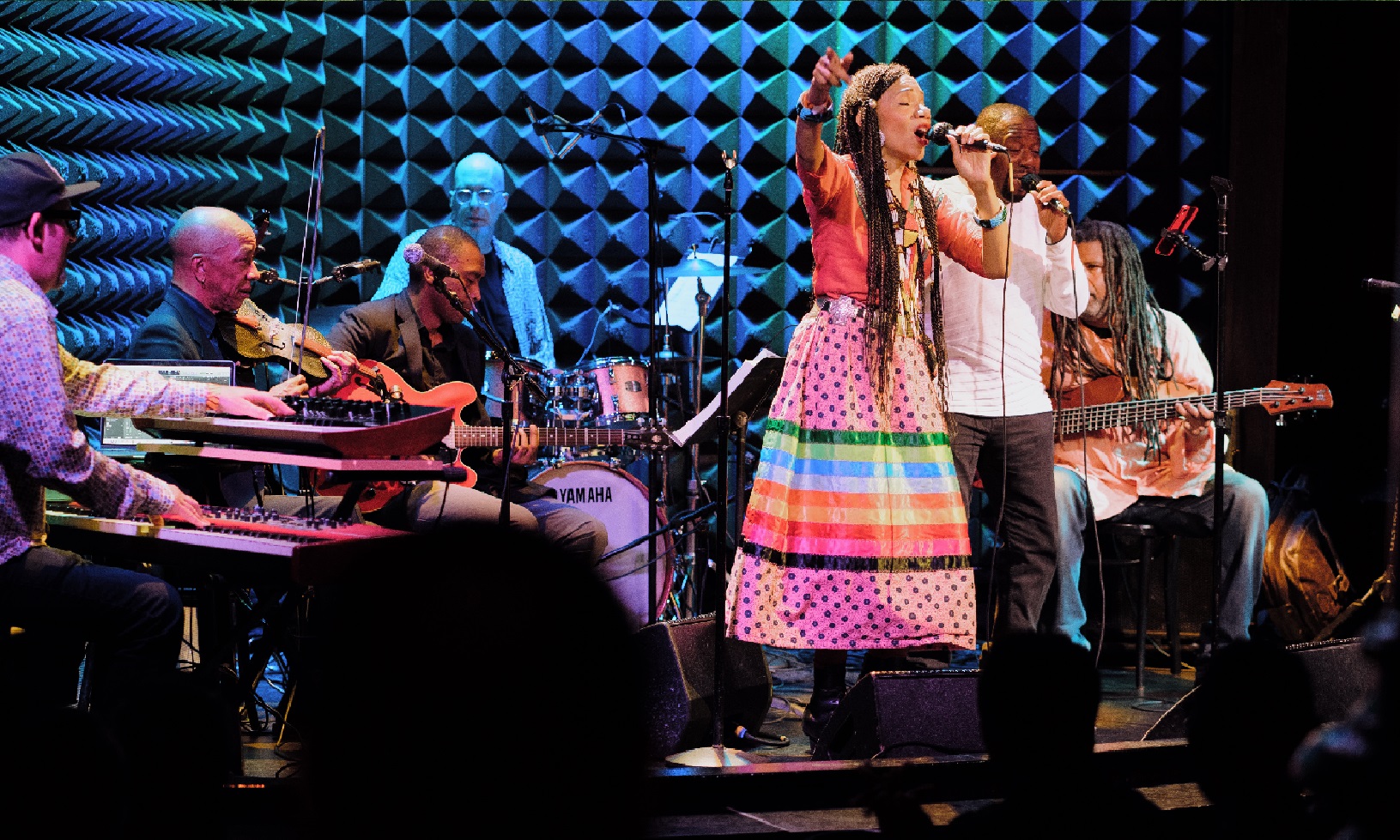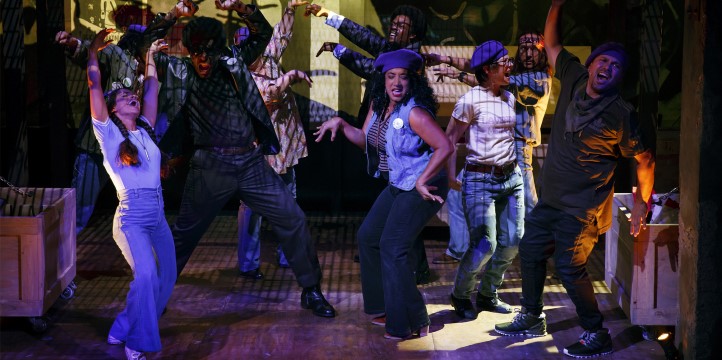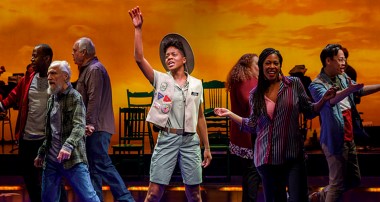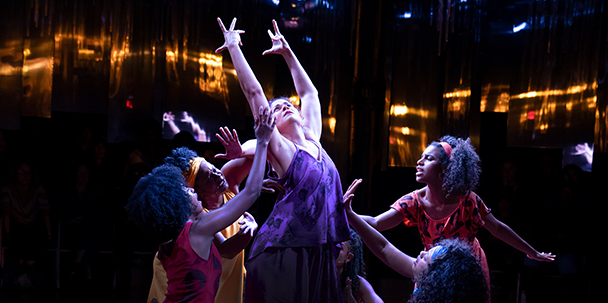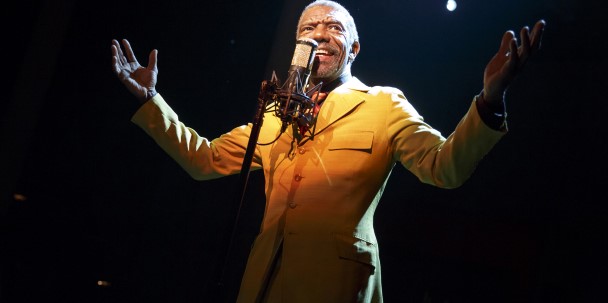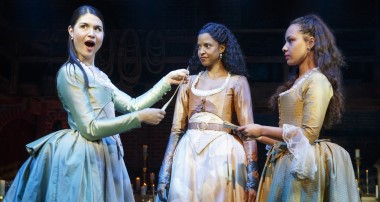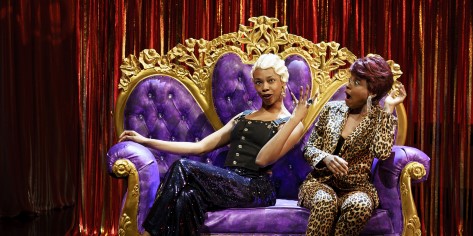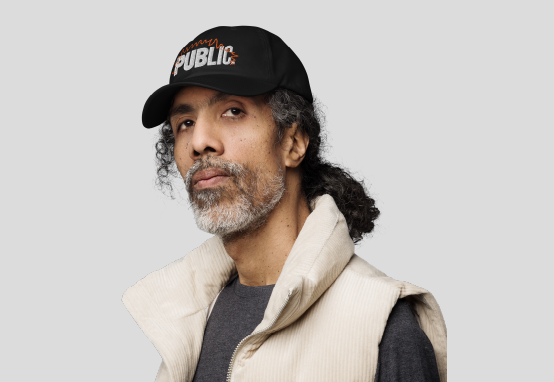SALLY & TOM “is America,” according to its director, Steve H. Broadnax III. “We are inviting people to look again.” With electric blue glasses glinting, he sets up my (and your) expectations for seeing Suzan-Lori Parks’ new play at The Public Theater, after premiering at the Guthrie Theater in Minneapolis. SALLY & TOM is about an off-off-off-Broadway theater troupe called Good Company, who are creating a show about Sally Hemings and Thomas Jefferson. Writer-director power couple, Luce (Sheria Irving) and Mike (Gabriel Ebert), star as Sally and Tom.
Parks’ metatheater swings with a bat—at the characters, at us. “It works on so many planes,” says Broadnax. “[It] speaks about Suzan-Lori, how we make a world, how our world is created.” Parks, like many other Black women writers, gravitate toward metatheater, resting in a lineage that includes Jackie Sibblies Drury, Alice Childress, and Adrienne Kennedy.
“There’s more going on than meets the eye,” Broadnax adds. “Black folks know that.” Meta serves “the spiritual, the emotional, the physical; in this world, in the next world, in the history beyond us.”
Perhaps this seed has been planted by all the many Black women who helped build his career—“Kamilah Forbes, Dominique [Morisseau], Katori [Hall], now Suzan-Lori”—making Broadnax perfect for this kind of work. He possesses superpowers as a writer, teacher, and director. (“I can talk actor,” he confirms.)
“Direction is a service job. I’m in service of the play, which is the baby and its parent, its mother, in this case [Parks],” Broadnax notes. “Each production has been my own therapy. Learning more about our humanity and who we are and who I am as an artist, a queer man, all of it has allowed me space to authentically be.” That must be why Katori Hall names him the “doula of new work.” His directing is a humanitarian project.
At the orbit of Broadnax’s collaborative center is the phrase “people over plays.” Peek into Broadnax’s rehearsal room and you will find actors, stage managers, and crew alike forming a circle, with their days unloaded in the space between.
The alternative is bad manners: “You just come in. And start doing the play. Play first.” He puts his hands up. “Like, no, wait a minute! I just came here and you don’t know what people are bringing. You have to pretend that you are not a human being. No, let’s acknowledge your humanness.”
This philosophy might linger from Broadnax’s research trip to Thomas Jefferson’s former home and plantation, Monticello. Or the need to equalize the room has been passed down from his family of educators (particularly his 96-year-old grandmother). Either way, Parks’ script demands building a common vernacular.
“We watch an artist company and actors in the public create a world,” he says. “It allows us to respect, look again, at what you think you know, what you think you're going to see, what you think that these people are and who they are.”
Going back to meta (pressure), a recurring theme in the play and this interview, Broadnax reflects on his career, as a director and professor at Penn State: “In just working within the institution of commercial theater, of Broadway, I find it an honor to look back and then as an educator to look forward. Now I take on the responsibility for that next person. They can take that knowledge and even pass the baton to the next generation so that they can stand on the work that I stand on and what my ancestors did for me. We are still building this ladder forward, upward.”
At least, because Broadnax is looking at the “E Pluribus Unum,” a line from the play (and the dollar bill) meaning “out of many, one,”, it allows him so much passion for theater’s future. He has more petals to hand out: for Robert O’Hara, Kenny Leon, Lee Edward Colston II, and Ruben Santiago-Hudson. When you see their work, and when you see SALLY & TOM, you’ll think of Broadnax’s sentiment: “We’re all so connected as one.”
I understand what Broadnax means. As a Black dramaturg, I’m often thinking about blurs and connections. About the chain between me, the script, and the audience; the past sitting on top of me, of the present haunting Luce onto the stage, and a future you sitting in the theater. The three of us could knead until the other becomes dough. What does it mean to take all of that baggage into the theater? Hopefully: More great shows.
SALLY & TOM begins performances on Thursday, March 28 and runs through Sunday, May 5. Click here for more information on the show and how to get tickets.
Octavia Washington is a New Yorker, fashion nerd, writer, and aspiring dramaturg. She’s a graduate of Carleton College with a degree in English and current candidate for a Master’s degree in Dramaturgy at Columbia University. Outside of academia, she can be found shopping until dropping, probably, or on Instagram @octaveeah/@octaviareads.
This piece was developed with the BIPOC Critics Lab, a new program founded by Jose Solís training the next generation of BIPOC journalists. Follow on X: @BIPOCCriticsLab.
Pictured: Kate Nowlin, Sheria Irving, Gabriel Ebert, Leland Fowler, and Sun Mee Chomet. Photo Credit: Joan Marcus.


